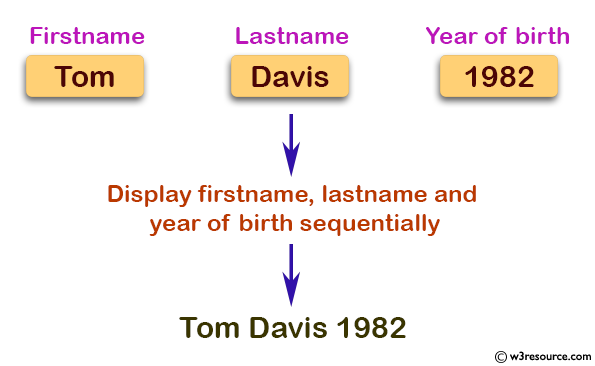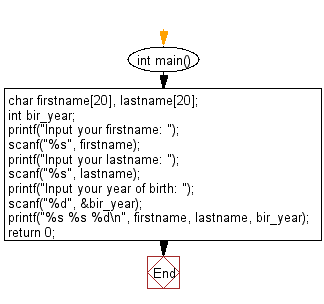C Exercises: Display firstname, lastname and year of birth sequentially
C Input Output statement: Exercise-7 with Solution
Write a program in C that reads a firstname, lastname and year of birth and display the names and the year one after another sequentially.
Pictorial Presentation:

Sample Solution:
C Code:
#include <stdio.h>
int main()
{
char firstname[20], lastname[20];
int bir_year;
printf("Input your firstname: ");
scanf("%s", firstname);
printf("Input your lastname: ");
scanf("%s", lastname);
printf("Input your year of birth: ");
scanf("%d", &bir_year);
printf("%s %s %d\n", firstname, lastname, bir_year);
return 0;
}
Sample Output:
Input your firstname: Tom Input your lastname: Davis Input your year of birth: 1982 Tom Davis 1982
Flowchart:

C Programming Code Editor:
Improve this sample solution and post your code through Disqus.
Previous: Write a program in C that takes minutes as input, and display the total number of hours and minutes.
Next: Write a program in C to calculate the sum of three numbers with getting input in one line separated by a comma.
What is the difficulty level of this exercise?
Test your Programming skills with w3resource's quiz.
C Programming: Tips of the Day
Static variable inside of a function in C
The scope of variable is where the variable name can be seen. Here, x is visible only inside function foo().
The lifetime of a variable is the period over which it exists. If x were defined without the keyword static, the lifetime would be from the entry into foo() to the return from foo(); so it would be re-initialized to 5 on every call.
The keyword static acts to extend the lifetime of a variable to the lifetime of the programme; e.g. initialization occurs once and once only and then the variable retains its value - whatever it has come to be - over all future calls to foo().
Ref : https://bit.ly/3fOq7XP
- New Content published on w3resource:
- HTML-CSS Practical: Exercises, Practice, Solution
- Java Regular Expression: Exercises, Practice, Solution
- Scala Programming Exercises, Practice, Solution
- Python Itertools exercises
- Python Numpy exercises
- Python GeoPy Package exercises
- Python Pandas exercises
- Python nltk exercises
- Python BeautifulSoup exercises
- Form Template
- Composer - PHP Package Manager
- PHPUnit - PHP Testing
- Laravel - PHP Framework
- Angular - JavaScript Framework
- Vue - JavaScript Framework
- Jest - JavaScript Testing Framework
